Anarchism is a tricky subject for many Marxists. We know that anarchists should be our allies, but there is bad blood between us and them; blood, anarchists would say, that is mainly theirs. This book Revolutionary Affinities: Towards a Marxist-Anarchist Solidarity (2023, PM Press) by two Marxists, Michael Löwy and Olivier Besancenot, just translated into English, shows that this way of viewing the history overlooks many connections between the two traditions, and, more than that, there are many things that we Marxists need to learn from anarchism.
Confusions
There are a number of sticking points that are bound up with representations of anarchism in popular culture and the bitter history that Marxists keep repeating to account for failures of revolution. One is the appropriation of the term by liberal individualists – those who want to keep a distance from any particular political commitment because they don’t trust “politicians” (which is of itself often an understandable suspicion of authority) – and they tend to use the term as an excuse. How many times have you heard a friend or family member say that they won’t take a position or do anything to change the world because they are “a bit of an anarchist”? But there are plenty of bureaucratic and apolitical characters around the world who use the term “Marxist”, so that isn’t good reason to tar all the anarchists with the same “petit bourgeois” brush.
Another sticking point is the bad example of anarchist movements over the course of history, with the most popular case trotted out by Marxists, particularly Trotskyists, being the participation of anarchist organisations in the disastrous “popular front” government in Spain that led the leadership to call on those resisting fascism to lay down their arms and thus leading to catastrophic defeat. It is then too easy to accuse anarchists of being prone to compromise with authority at the crucial moments of struggle, with the “popular front” being an instance of class compromise in politics (as opposed to the “united front” in which we voice our differences, march separately and strike together). But, again, we will find plenty of instances of Marxists, and not only Stalinists, doing the same kind of thing when faced with opportunities and temptations of power, so that isn’t reason to pin all the blame on anarchists as if they never learn from their own history.
The most problematic confusion and sticking point that makes it difficult for some Marxists to form lively open democratic united front campaigns with anarchists is the accusation that at times of successful revolution when it is necessary to have a degree of discipline, anarchists are just a little too dead set on rebellion against authority and thus liable to be used as cats paws by counterrevolutionary movements.
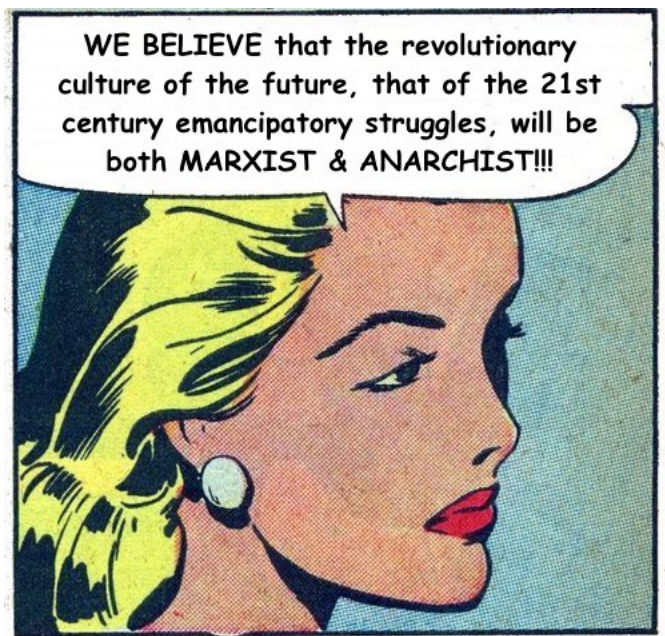
Here the problem is a little deeper and too many Trotskyists who should know better after their own bloody struggle with Stalinism (in which, indeed the blood is mainly theirs) fall in line with the “defence of the revolution” argument that sees anarchism as a disruptive force, disruptive at the wrong time. But isn’t it the task of revolution to anticipate in its forms of struggle the kind of society we want to build, and shouldn’t we hear the demand for democratic open debate as something that reminds us what revolutionary struggle is all about?
Connections
It is easy to confuse anarchism with chaos and disorganisation, and that is the way anarchism, much to the anarchists’ annoyance, is presented in the mainstream press, but nothing could be further from the truth. In fact, one of the founders of Russian anarchism, Peter Kropotkin – the anarchist formerly known as prince – was concerned with the way that human solidarity is built into our human nature.
It is easy to confuse anarchism with chaos and disorganisation, and that is the way anarchism, much to the anarchists’ annoyance, is presented in the mainstream press, but nothing could be further from the truth.
Against the neoliberal image of the human being as intrinsically separate from others, competing with others and only coming together for short term gains, Kropotkin was in tune with the underlying Marxist view of the human being as, in Marx’s own words “an ensemble of social relations”. We are nothing without other people, without the relationships that make us human, and Kropotkin takes this further, showing that our “animal nature” is not something that is waiting to burst out into rivalry and chaos but is itself a source of cooperative activity, “mutual aid”, the very basis of a communist society.
“Against the neoliberal image of the human being as intrinsically separate from others, competing with others and only coming together for short term gains, Kropotkin was in tune with the underlying Marxist view of the human being as, in Marx’s own words ‘an ensemble of social relations’.”
There are countless other theoretical connections between anarchism and Marxism that actually deepen the relationship between the two traditions (and you will often hear this connection being voiced in conversations between anarchists and Marxists on a good day when they are happy to agree on the eventual endpoint of the struggle to end capitalism, patriarchy and the manifold forms of oppression that bind us into authority).
The main concern of this book by two Marxists, Michael Löwy and Olivier Besancenot, writing from a political tradition in the Trotskyist movement that has attempted to learn from the struggles of the oppressed and put democratic organisation at the forefront of its work, is not, however, conceptual but practical. Yes, there is a discussion of some anarchist-Marxist hybrid theoreticians like Walter Benjamin and André Breton and Daniel Guérin, but if we look back at the history of revolutionary struggle, we see highlighted in the book a practical political link being forged between Marxists and anarchists.
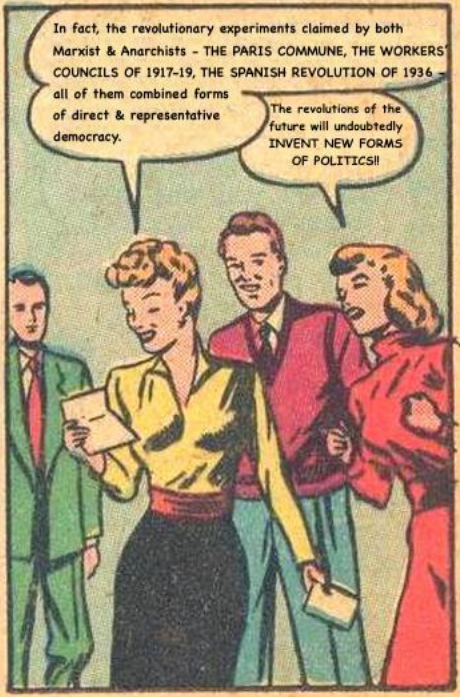
There is a history in this book of joint action that range from the “First International” in which Marx and anarchists debated (and sometimes squabbled) and fought together (and sometimes with each other) to the Spanish Civil War. We read about the courageous work of anarchists like Emma Goldman, the one who didn’t want a revolution in which she could not dance, who did actually initially support the 1917 Russian Revolution, and travelled there to argue alongside and, when necessary, with the Bolsheviks. She attended and spoke at the funeral for Kropotkin, an event that was allowed by the Soviet authorities, even at a time of intense threat from outside counterrevolutionary forces such was the level of popular support in the country for anarchist ideas.
“There is a history in this book of joint action that range from the ‘First International’ in which Marx and anarchists debated (and sometimes squabbled) and fought together (and sometimes with each other) to the Spanish Civil War.”
Rebellion
The most contentious part of the book for some Marxists, and we should hope that this honest reckoning with the past will be read and responded to by our anarchist comrades, is the account of the Kronstadt insurrection and its suppression by the new Soviet state in 1921. We are at that point when the Russian revolution had managed to hold up against the invasion of the country by twenty-one armies from fourteen different capitalist powers, but, partly as a consequence of the civil war, with a militarised state apparatus still on war footing, and with the Bolsheviks at the head of the state tangled in its own kinds of confusion. The key confusion, Löwy and Besancenot point out, was between the state and the parties, in particular between the Soviet state built from the base up from the workers councils that overthrew the Tsarist state and the Communist Party.
It is in that context that the sailors at the Kronstadt fortress, sailors who had been actively involved in the revolution, put forward a key demand on the front page of their newspaper Izvestia, which was “All Power to Soviets, and not Parties!” Lenin gave a report to the tenth congress of the communist party in the midst of this revolt in which he shamefully branded the Kronstadt rebellion as counterrevolution and “petty bourgeois anarchism”.
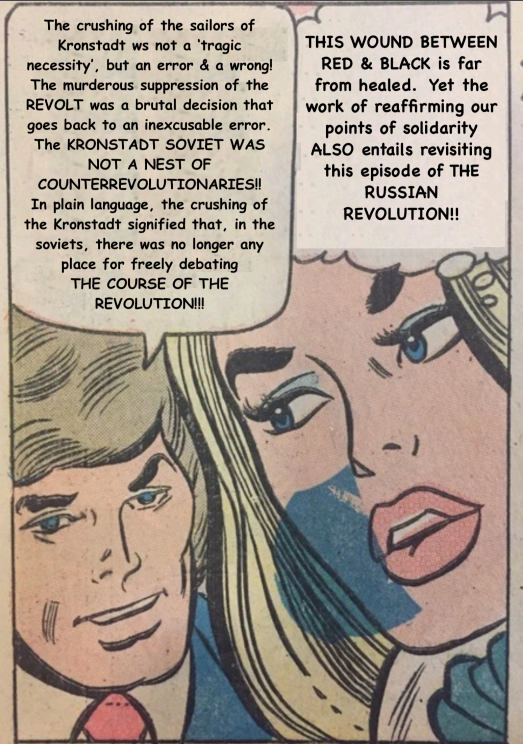
Trotsky also condemned the sailors, and it is that defence of the actions of the Soviet state in suppressing Kronstadt in the name of defending the Russian revolution as such that was then relayed down through the years, not only in the Stalinist tradition (where we would expect crocodile tears) but also in the Trotskyist tradition. The phrase “tragic necessity” is then repeated by Trotsky and many of his followers. That, Löwy and Besancenot argue, was an “error and a wrong”.
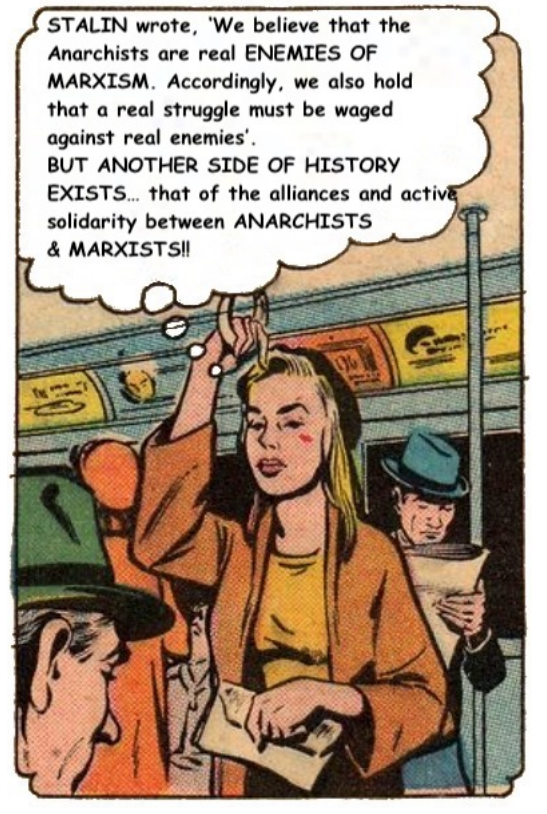
We need, as Marxists, to come clean about history, and “tragic necessity” is a weasel-phrase that does not do justice to it, instead this is a moment when we need, as Löwy and Besancenot put it, to say that “In plain language, the crushing of Kronstadt signified that, in the soviets, there was no longer any place for freely debating the course of the revolution.” There are difficult lessons from the book alongside inspirations, things to work through in our joint action as well as examples of liberation, of the best practice of revolution.
Lessons
The book, originally published in French in 2014, was translated into English by David Campbell while he was in prison, in Rikers Island, for political activities, and so, while we read the book, we accompany him in the task of working our way through an argument that is by radicals for radicals. We won’t have to struggle through this with dictionary in hand, as David did, but thanks to him we now also have a hopeful prospect, that the book will not only be read by Marxists because it is written by two of them, but will be read by anarchists who will be able to notice something profoundly “anarchist” in the argument.
“we now also have a hopeful prospect, that the book will not only be read by Marxists because it is written by two of them, but will be read by anarchists who will be able to notice something profoundly “anarchist” in the argument.”
The overall message is that we need to learn from history instead of simply repeating it, and to put aside what are mainly misunderstandings and petty disputes in order to work together. Affinity is strength, our collective strength, and here is a useful tool to enable us to combine quite different powerful energies of revolt to actually do what activists in both traditions have always wanted to do, change the world for the better.
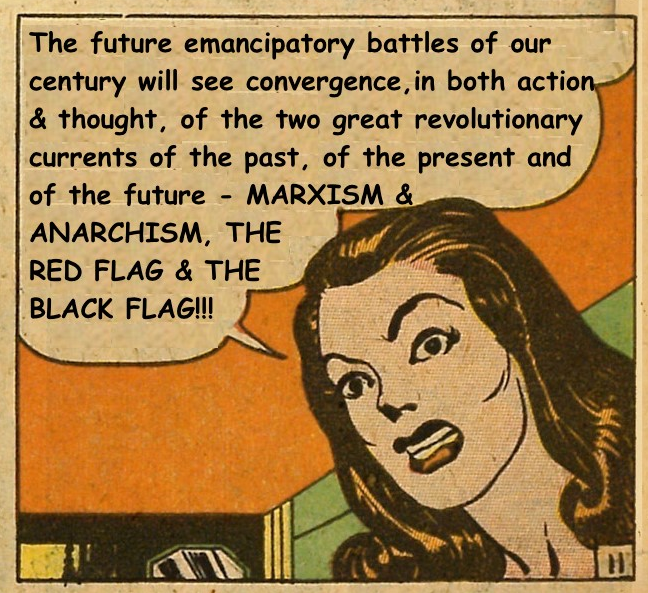
Images: https://www.johnrichardsonsurreal.com/
Art (54) Book Review (127) Books (114) Capitalism (68) China (81) Climate Emergency (99) Conservative Government (90) Conservative Party (45) COVID-19 (45) EcoSocialism (60) Elections (83) Europe (46) Fascism (62) Film (49) Film Review (68) France (72) Gaza (62) Imperialism (100) Israel (129) Italy (46) Keir Starmer (56) Labour Party (115) Long Read (42) Marxism (50) Marxist Theory (48) Palestine (179) pandemic (78) Protest (154) Russia (341) Solidarity (146) Statement (49) Trade Unionism (142) Ukraine (349) United States of America (134) War (370)
Latest Articles
- COP 30: entrenching the crisis of climate politicsHow has COP 30 failed to address the climate catastrophe? Brian Ashley looks at the continued crisis of political solutions to ecological disaster.
- Labour’s budget – further into the abyssRachel Reeves’s budget is business as usual, or rather, slightly worse than that. argues Jamie Gough.
- Your Party exists! Now the hard work begins…Your Party’s founding conference was a battleground between unelected bureaucrats and the left, but in the end it has produced a new socialist and working-class party. Simon Hannah and Terry Conway reports.
- Hands off Venezuela – No to Trump’s warACR condemns Trump’s imperialist attack on Venezuela
- Your Party Founding ConferenceFind all the key information from Anti*Capitalist Resistance for the Your Party Founding Conference. Below is the rolling blog for updates throughout conference.








OK, why don’t you engage in a debate with us over this, as you have expressed the hope in your article. I am sure that the Anarchist Communist Group would be happy to do this